|
|
|
Sort Order |
|
|
|
Items / Page
|
|
|
|
|
|
|
| Srl | Item |
| 1 |
ID:
171246
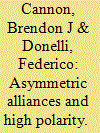

|
|
|
|
|
| Summary/Abstract |
The Middle East and the Horn of Africa exist in two distinct regional security complexes (RSCs), groupings of states exhibiting intense security interdependence within a distinct region, but rarely between regions. Recent geopolitical changes and related analyses, however, point to either a subsuming or a joining of the two RSCs, potentially leading to a high degree of uncertainty in two conflict-prone regions. Given the importance of such developments, we question this theory of RSC expansion by offering a concise review of recent security interactions between the two RSCs as well as quantitatively and qualitatively measuring the material power capabilities of relevant states. Borrowing from and contributing to RSC theory, we also identify and analyse concepts and indicators such as threat perception and sub-regional alliances. Our findings demonstrate the Middle East RSC is not expanding to include that of the Horn of Africa. The two remain distinct and under internal consolidation, despite the current discourse. Rather, high polarity in the Middle East coupled with often-congruent interests in Horn of Africa states best explains the current pattern of their interaction, particularly as Middle East states pursue strategies that further their own security interests at the expense of rival states within their own RSC.
|
|
|
|
|
|
|
|
|
|
|
|
|
|
|
|
| 2 |
ID:
171213
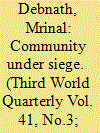

|
|
|
|
|
| Summary/Abstract |
This article presents and analyses the voices and responses of the research participants about the impact of exclusionary formal and informal education policies imposed on the Santal community in Palashpur, Bangladesh (Palashpur is a pseudonym for the site of my research; it is also a metaphor for contested space where the colonial power and politics of the nation state exert domination and subordination). These policies are implemented through a state-led, centralised, monolingual and exclusionary curriculum in local primary and secondary schools, schools run by the churches, and schools supported by nongovernmental organisations. The education policies in Bangladesh bear the legacy of the combined forces of cultural homogenisation and social exclusion rooted in the colonial learning structure and its objectives. Embedded in these policies are elements of the civilising mission, an ultra-religious assimilative but exclusionary nationalistic agenda, and Western values of modernity and development. In this rural context, these alien ideologies and practices in education are actively engaged in eliminating local institutions, the knowledge system of indigenous peoples, the texture of their lives, their joy of living, their spirituality and their sense of being. This article reveals how, imposed from above, education policy and practices have dispersed an indigenous community to negotiate a life that goes against the interests of the community itself and its members.
|
|
|
|
|
|
|
|
|
|
|
|
|
|
|
|
| 3 |
ID:
171248


|
|
|
|
|
| Summary/Abstract |
Working in Sri Lanka’s urban free trade zones (FTZs) introduces Sri Lanka’s rural women to neoliberal ways of fashioning selves, which subsequently not only shape village entrepreneurial activities but also initiate negotiations in kinship, marriage, domestic arrangements, and community relations. The knowledges and networks that they develop while at the FTZ allow former workers to connect with global production networks as subcontractors, making them part of the cascading system of subcontracting that furthers the precarity of regular FTZ work. This article explores how these former workers manipulate varied forms of capital – social, cultural and monetary – to become local entrepreneurs and community leaders, while simultaneously initiating changes in rural social hierarchies and gender norms. When neoliberal economic restructuring manifests within local contexts it results in new articulations of what it is to be an entrepreneur and what it is to be a worthy, young, married woman. Overall, the paper sheds light on the fragmented and uneven manner in which neoliberal ethos take root in rural South Asia.
|
|
|
|
|
|
|
|
|
|
|
|
|
|
|
|
| 4 |
ID:
171214
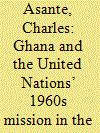

|
|
|
|
|
| Summary/Abstract |
This paper examines Ghana’s engagement in the United Nations (UN) mission during the Congo political crisis in the 1960s. The paper examines competing rationales behind Ghana’s decision to contribute towards the UN operation in the Congo. Ghana’s participation, to date, has been primarily understood through the lens of anti-colonial sentiment, African solidarity and regional influence. This article argues that in addition to these explanations, more attention must be paid to the value attached to pan-Africanism and the post-independence political union agenda of President Kwame Nkrumah. The article demonstrates how for Nkrumah, an operation under the aegis of the UN would prevent the powers of the Cold War (the United States and the Soviet Union) from interfering with the right of independent self-determination within Congo affairs. The UN mission, I contend, was a window of opportunity for Nkrumah’s larger pan-African ambition. Although Nkrumah’s mission failed, the article argues for the normative value of Nkrumah’s pan-African vision of promoting a regional structure to unify the African states as an important reason for Ghana’s participation in the Congo operation.
|
|
|
|
|
|
|
|
|
|
|
|
|
|
|
|
| 5 |
ID:
171099


|
|
|
|
|
| Summary/Abstract |
Over the last 20 years the local domain has gained widespread attention in the analysis of peacebuilding. While this debate has contributed to an important review of many assumptions underlying peacebuilding practice and analysis, the subjective domain of peacebuilding – how actors experience and make sense of these transformations – still needs to be more methodically explored. In particular, while different narratives of peace have been analysed in this literature, much more rarely has there been a systematic discussion linking peace with power and violence and the different understandings and experiences around these two concepts. In this article I argue that integrating violence and power more systematically in the local turn and exploring their subjective domain can greatly benefit this debate, including by contributing to the elaboration of conceptual and theoretical tools more aligned with Southern epistemologies.
|
|
|
|
|
|
|
|
|
|
|
|
|
|
|
|
| 6 |
ID:
171247
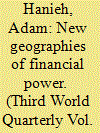

|
|
|
|
|
| Summary/Abstract |
A growing body of critical scholarship has examined the recent growth of Islamic finance (IF), unpacking its ethical assertions and highlighting its close affinities with conventional financial instruments. Receiving less attention, however, is the relationship between the global expansion of IF and the emergence of new financial actors and zones of accumulation. This article situates the evolution of global Islamic circuits alongside processes of capital accumulation in the Gulf Cooperation Council (GCC), arguing that contemporary IF is deeply bound up with the internationalisation of capital groups headquartered in the GCC. This is evident in the internationalisation of GCC Islamic banks, which has given the Gulf a powerful foothold in new markets and a variety of sectors that are typically considered ‘non-financial’. Simultaneously, the expansion and geographical diversification of Islamic debt (sukuk) issuance is refashioning the Gulf’s relationships with other global spaces, a process that looks set to intensify given the widespread push to utilise IF in development financing. Seen from this perspective, the global growth of IF sits in a mutually constitutive relationship with patterns of capital accumulation in the Gulf, as well as the region’s burgeoning weight within (and new linkages to) the global economy.
|
|
|
|
|
|
|
|
|
|
|
|
|
|
|
|
| 7 |
ID:
171212


|
|
|
|
|
| Summary/Abstract |
This study examines the relationship between religion and politics in current Turkish society, particularly since the Justice and Development Party (AKP) consolidated its power over state institutions and replaced the Kemalist establishment in the early 2010s. It argues that the AKP has re-instrumentalized the Presidency of Religious Affairs (Diyanet) and used its mosques to enact a performance of nationalism, deviating from a Kemalist, laicist-national identity towards a more encompassing, Ottomanist, religious one. After discussing the unique understanding of laicism in Turkey and the transformation of Diyanet as a state apparatus, content and discourse analyses are used to examine the texts of 1,200 Friday khutbas, weekly prayers that are ordinarily prepared and distributed nationwide by Diyanet. These indicate how citizens perform their nation simply by participating in gatherings, composing the congregation, listening to imams, and being exposed to the reminders of their (re-)identified nationality. The content analysis of Friday khutbas over three distinct periods—1927, 1997–2010, and 2011–2018—illustrates that, as political power shifts over time, the repetition of certain banal reminders used in the khutbas has resulted in different performances of the nation and that, under the rule of the AKP, a new performance has already begun.
|
|
|
|
|
|
|
|
|
|
|
|
|
|
|
|
| 8 |
ID:
171103
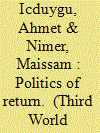

|
|
|
|
|
| Summary/Abstract |
Although the Syrian conflict continues, local and global stakeholders have already begun to consider the return of the six million refugees, especially as neither the option of local integration in the countries of first asylum nor that of resettlement to third countries is seen as a realistic possibility. Elaborating on the return debates in Turkey, Lebanon and Jordan, we relate the politicisation of this question to the growing acceptance of the option of voluntary and involuntary repatriation in the international refugee regime as well as to policies and public opinion. We argue, based on empirical fieldwork, that any debate about the return of Syrian refugees is problematic, since the conditions of safety, voluntariness and sustainability are not fulfilled. Further, returns should not be left entirely to the individual hosting states and actors in the region but should be carried out in collaboration with representative authorities in Syria and the mediation of international organisations upon full resolution of conflict.
|
|
|
|
|
|
|
|
|
|
|
|
|
|
|
|
| 9 |
ID:
171245
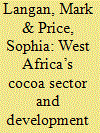

|
|
|
|
|
| Summary/Abstract |
The EU is vigorously pursuing Economic Partnership Agreements (EPAs) in its trade and aid relations with African, Caribbean and Pacific (ACP) countries. Justifying the EPAs as being ‘development friendly’, EU officials promise that aid support to private sector development (PSD) in ACP countries will make free trade systems ‘win–win’. This article, based on the authors’ semi-structured interviews conducted in Ghana and Nigeria, examines the perspectives of cocoa stakeholders vis-à-vis EPAs and PSD. Applying critical discourse analysis to interview transcripts, it underscores areas of overlap and, crucially, divergence among cocoa stakeholders’ own narratives on PSD support in the context of EPAs and the official legitimating discourse of EU institutions. In the process, the article draws critical attention to cocoa business interviewees’ concerns regarding the impact of premature trade liberalisation. It also underscores cocoa stakeholders’ concerns that EU PSD promises are not being fulfilled in terms of actual tangible benefits for business people in this vital ACP export sector. Accordingly, the article contributes to, and corroborates, an existing critical scholarly literature which problematises the strategic functions of donor PSD discourse in presenting free trade reforms as being ‘pro-poor’ in the post-Washington Consensus.
|
|
|
|
|
|
|
|
|
|
|
|
|
|
|
|
| 10 |
ID:
171101
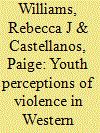

|
|
|
|
|
| Summary/Abstract |
Youth violence is a growing challenge worldwide, particularly in countries that are experiencing extreme social disorganisation. This is exemplified in Honduras which has been one of the top five countries in the world for intentional homicides for over 20 years. While many studies have examined youth violence in urban cities, few have researched youth violence in rural zones. This study presents a case study using social disorganisation theory to investigate the perceptions of 40 youth in rural and peri-urban Santa Rosa de Copán, Honduras, regarding what drives violence and the potential solutions. Consistent with social disorganisation theory, our results demonstrate that youth view violence as an opportunity pathway resulting from economic deprivation, disruptions to the family and neighbourhood, lack of or poorly functioning external agencies and conflicting moral values. There are significant gender differences in the results, with young men pointing to several issues that challenge masculine hegemonic gender norms such as the desire for love and belonging, participation in education and the role of policing.
|
|
|
|
|
|
|
|
|
|
|
|
|
|
|
|
|
|
|
|
|